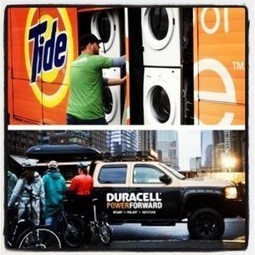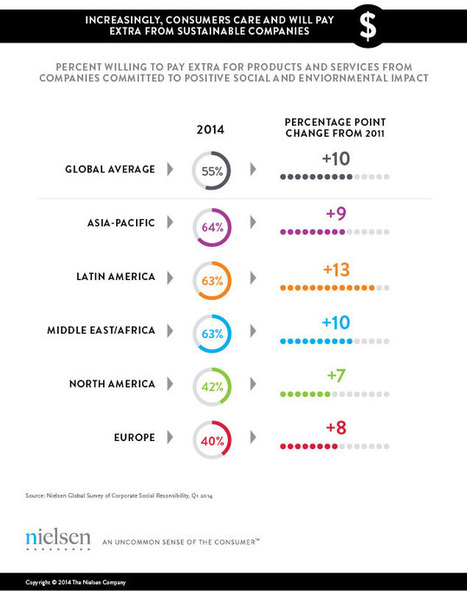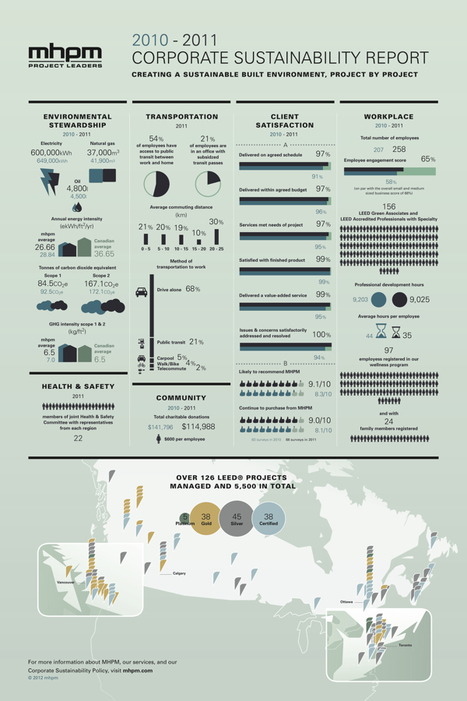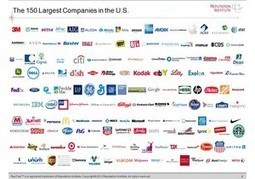 Your new post is loading...
 Your new post is loading...
Every business must serve a social purpose”. These are not the words of a social campaigner or a politician; they are the words of a banker, Ashok Vaswani, the CEO of Retail and Business Banking at Barclays, one of the world’s largest banks. Barclays has been involved in at least one major trading scandal and holds the dubious honour of the most fined bank in Britain. There will be some people who will treat his words with understandable cynicism but that would be to miss the point.
The point is not whether the words are sincere or not – it is that they should have been said at all. Banks are concerned with the control of money, why should they concern themselves with any purpose beyond that? The reason is that society is demanding they do. When banks first started they fulfilled a social need in the community, to enable ordinary people to fund their ambitions. Over the years banks forgot that purpose and focused most of their efforts on funding their own ambitions through obscene profits, often at the consumer’s expense. The bubble burst in spectacular fashion with the downfall of Lehman Brothers in the US and RBS in the UK.
It isn’t just the banks that have lost their way. Now it’s critical for any business to demonstrate it has a purpose before, and beyond profit; that it seeks to improve the lives of its customers as a primary goal. Failure to have such a purpose, to be clear about it and to ensure it directs everything you do, will lose customers, employees and ultimately business value....
More than half (55%) of global respondents in the survey said they are willing to pay extra for products and services from companies that are committed to positive social and environmental impact—an increase from 50 percent in 2012 and 45 percent in 2011. Regionally, respondents in Asia-Pacific (64%), Latin America (63%) and Middle East/Africa (63%) exceed the global average and have increased 9, 13 and 10 percentage points, respectively, since 2011.
While a willingness to pay extra for sustainable products is comparatively lower in North America (42%) and Europe (40%), both regions show an increase in purchasing sentiment from 2011, rising 7 and 8 percentage points, respectively....
In case you missed it, Bloomberg Businessweek published an intriguing story yesterday by veteran journalist Paul M. Barrett that ran with the headline “What It’s Like to Be Attacked by Putin’s Flack.”
The “flack” in question is Ketchum — more specifically D.C.-based partner Kathy Jeavons, who “heads both the Ecuador and Russia accounts” for the firm.
For the record, Jeavons did not personally attack or even contact Barrett. But a source did forward him a talking points document that the firm wrote for Nathalie Cely, Ecuador’s ambassador to the United States. The doc included both well-stated observations about Ecuador’s history with Chevron and suggestions for casting doubt on the credibility of Law of the Jungle, Barrett’s upcoming book on the lawsuit that accuses the company of abusing its relationship with the people of Ecuador....
In a consumer-driven economy, the good a company does is increasingly becoming its defining competitive advantage. While CSR, cause marketing and sustainability might have seemed like nice-to-dos just a few years ago, articulating your brand's core values is now critical in terms of the reputational, employee productivity, and bottom line impact to your company.
As Rich Fernandez, Director of Executive Development at Google, said recently at Sustainable Brands '13, If a company's product is not improving lives, it's diminishing them." In the face of rising consumer activism, Marketing 3.0 will be won by those who become purpose-driven social brands. To do so, the CMO, CSO, CSR, and Foundation leads must align to bring a cohesive brand story to life that clearly defines the company's "social license to operate....
MHPM Project Managers has taken a different approach with the release their first CSR (Corporate Sustainability Report). Instead of the normal text report that other companies release, MHPM created an infographic poster with all of their sustainability information. It serves as a great example to their clients of how even CSR data can be designed in an engaging way. [Innovative model and CSR reporting tool~ Jeff]
When you browse the aisles of your grocery store, fill up your tank at the gas station, or book a flight online, chances are, when you make a decision to choose one brand over another, you're influenced more by the company's reputation than by any particular product it offers. ...In the first quarter of 2012, Reputation Institute conducted an online study among 10,198 consumers. It measured consumers’ perceptions of those companies among the 150 largest in the U.S. that they were “somewhat” or “very” familiar with. Each company earned a “RepTrak Pulse” score of 0 to 100, representing an average measure of people’s feelings–or reputation–for a company. The scores were statistically derived from four emotional indicators: trust, esteem, admiration, and good feeling. Reputation Institute then analyzed what it calls the seven dimensions of corporate reputation. That’s where it found that perceptions of the enterprise (workplace, governance, citizenship, financial performance and leadership) trumped product perceptions (products and services plus innovation) in driving behaviors....
"...a big question for companies is to what extent CSR - specifically behavior that affects the environment - actually alters shareholder value. Is it better to pursue a single bottom line, or do shareholders benefit more when a company supports the “triple bottom line” that includes people, the planet, and profits?..." Worth reading!
|
The Marketing Society defines marketing’s primary role as follows: “To create sustainable growth by understanding, anticipating and satisfying customer need”.
We invest serious resources to probe, sense and respond to customer needs, yet we disregard the fact that well-being is just as much a consumer need. Not addressing it could potentially drive down demand.
Well-being goes beyond the individual to the community and all the way to the planet that we inhabit.If we overlay this with the fact that concern for a consumer’s well-being is one manifestation of corporate social responsibility (CSR), it becomes apparent that marketers have a reason to be actively engaged in CSR...
Investigating the gun industry, Muslim extremists, and high-stakes litigation, I’ve grown accustomed to deadline intimidation from corporate legal departments or an executive’s personal PR squad, but only this week am I getting a feel for what it’s like to be the target when a sovereign nation goes into crisis-communication mode.
Worried about revelations in Law of the Jungle, my soon-to-be-released book about the epic Chevron (CVX) oil pollution case, the Republic of Ecuador’s U.S. public relations advisers, New York-based Ketchum, has sent a six-page, single-spaced memo to Ecuador’s ambassador to the U.S., Nathalie Cely. Marked “reservado y confidencial,” the memo, prepared in Spanish throughout, outlines “difficult questions” the book raises “that negatively affect Ecuador,” and includes an ad hominem swipe. “It remains unclear when and how many times Barrett visited Ecuador or if he interviewed anyone from the Government,” the memo states. “This can be converted into a point that we can raise, but only in suitable settings and among appropriate journalists.”
I obtained a copy of the memo from a helpful noncombatant who works for neither Ketchum nor the ambassador and who requested anonymity for all the obvious and usual reasons. The damage-control document is a peculiar combination of advice on how to discredit the messenger—“this can be converted into a point …”—and admissions that the book raises issues that do not reflect well on Ecuador’s government....
Transparency can look different depending on the audience and the context. Find out which brands exemplify what it means to be transparent today.
Openness has never been more important in marketing and in business. Being transparent begins with knowing your customers—it requires having a relationship with your community of customers and engaging in ongoing dialogue, and many brands are increasingly turning to an online insight community to enable this type of deep engagement and learning.
As the examples below show, transparency can look different depending on the audience and the context. Here are 5 brands that provide examples of what it means to be transparent today....
Some of the worst PR stories for fashion retailers happened in recent weeks. But will it cause any major upset of the business’ financial performance. It’s been a dreadful couple of weeks for garment workers and fashion retailers. There was a glimmer of joy this week when Bangladesh rescuers found a survivor 17 days after a garment factory collapsed and killed more than 1,000 workers. Then last week, teen idol retailer Abercrombie & Fitch stirred up a social media controversy when CEO Mike Jeffries confessed A & F would never make sizes XL for women because the brand is targeted toward “the cool kids”....
Because firms don't need to disclose political contributions, we don't know who's lobbying for what.are you Newsweek just released its fourth annual Green Rankings, grading the "greenness" of the 500 largest publicly-traded companies in the world. In partnership with research firms Trucost and Sustainalytics, companies are ranked based on their management, performance, and transparency in the environmental domain. One of us (Toffel) was a member of Newsweek's advisory panel. Thanks to that involvement and our research on green ratings, we understand the many challenges of rating firms' environmental performance. While leading assessments like Newsweek's are admirably rigorous and comprehensive, all major green rankings have an important blind spot: They do not account for corporate lobbying and campaign contributions around environmental policy. After all, no matter how green a company's operations and supply chains are, political efforts aimed at weakening environmental laws and regulations can have far greater environmental impact. Unfortunately, we know little about corporate political activities since much of it occurs behind closed doors. So whether companies are pushing to strengthen environmental regulations or lobbying to weaken them, none of this crucial information is incorporated into green rankings. You might think that companies that are transparent on environmental issues would also be forthcoming about their political activities. But perhaps not....
When it comes to determining the primary audience for sustainability reports, is it investors, customers or another stakeholder group? A recent study by Ernst & Young and GreenBiz.com found employees to be the second most important audience for sustainability reports. That’s not surprising when you consider that the study also found employees to be second only to customers as drivers of sustainability initiatives. But consider this: the 2012 Edelman Trust Barometer found that company communications are distrusted by workers at all levels. Only 29% of executives and 21% of employees trust such communication. That’s a wake-up call to leaders and communicators for less spin and more candid, meaningful narrative....
|



 Your new post is loading...
Your new post is loading...



















This is a thoughtful post about what it takes to be a purposeful brand. Barclays Bank and Volkswagen need not apply lhough there is a long list of others that don't measure up!